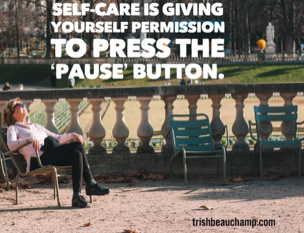
Being self- full is allowing yourself to meet your own demands. Being selfish is wanting others to meet your demands.
Self awareness is about understanding yourself; your personal preferences and how you behave. Self management is taking responsibility for your behaviour and wellbeing. Marry the two and I believe you have a healthy balance of self-care — being self-full. ?
Below, I have outlined some guideposts that I have found helpful in my own life to achieve healthy self-fullness.
Guidepost #1: PAUSE and become aware of the moment.

A pause allows us to check in with what our body, soul and mind is needing at a particular time. Is it stillness? Is it stimulation? Do you feel like soaking in a bubble bath — or dancing the night away with friends?
“It takes courage to say yes to rest and play in a culture where exhaustion is seen as a status symbol.” Brené Brown
How can you honour your mind, body and soul with self-care, today? ?
Guidepost #2: Know your stress — manage what is manageable.

When we recognise our stress triggers we can know how to manage them.
To expect a stress-less life is unrealistic. However, anxiety is future based — predicting the unknown. Worry can be a natural reaction to past negative experiences, believing they will be repetitive in our life.
“The greatest weapon against stress is the ability to choose one thought over another” William James
How can you change your thoughts, about a perceived stressful situation, so you no longer need to feel anxious??
Guidepost #3: Embrace all parts of who you are

When we become empowered, with knowing who we are, we discover a truth that allows us to feel ‘ free to be me.’
“The path of individuation asks for total integration of all facets of the self: good, bad, and ugly. Don’t get discouraged by the difficult moments and emotions… uncovering and understanding the self is a lifelong journey that demands rejection of conventional attitudes and the mask of positivity.” Vanessa Smith Bennett
Each day, we get to choose our thoughts, feelings, actions and attitudes.
What parts of your life have you consciously taken responsibility of and what parts of your life do you still need to take responsibility for? ?
Guidepost #4: Accept ‘what is’

When we understand our unmet expectations can cause us pain, we can know how to respond to the disappointment that created the
“On disappointment: Don’t immediately brush it off. Feel it first, and then it will leave you quicker. Here’s the thing about broken glass: it needs to be acknowledged and swept up so you don’t step on it later.” Victoria Erickson
Feeling disappointed is a result of broken expectations — expectations in our relationships, expectations of our life being a certain way.
We can ignore the broken shards of painful emotions and invite future injury — or acknowledge what expectation has just been shattered, clear up the mess and move on with life. Everyone has broken glass experiences.
Can you be expectant of desirable outcomes, without dwelling on disappointments of unmet expectations? ?
“In the long run, we shape our lives, and we shape ourselves. The process never ends until we die. And the choices we make are ultimately our own responsibility” Eleanor Roosevelt
Being self-full is not being selfish, self-centred, self-absorbed or self-indulging in unhealthy behaviours.
Being self-full is a daily decision of being as full of life’s choices, available to you, as you decide to be. ?

